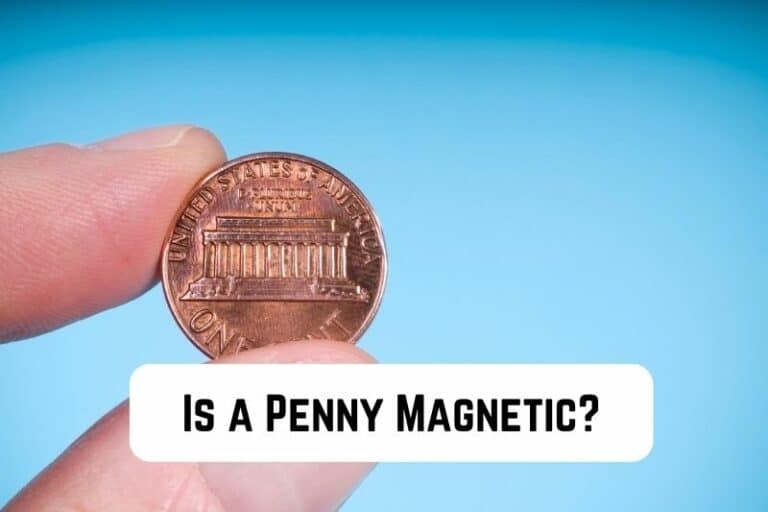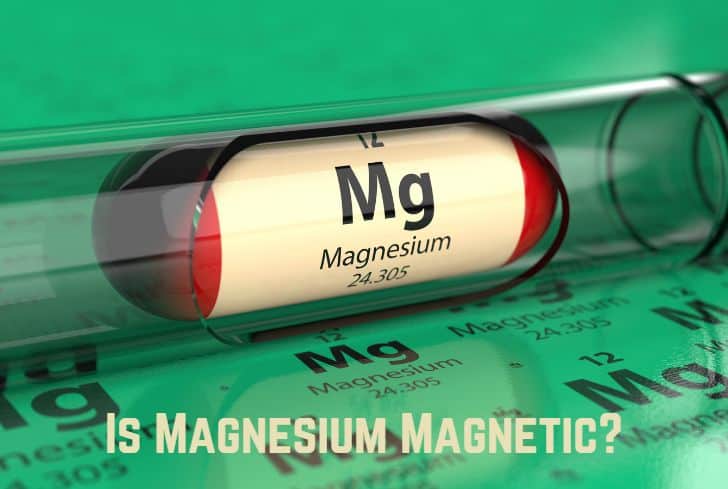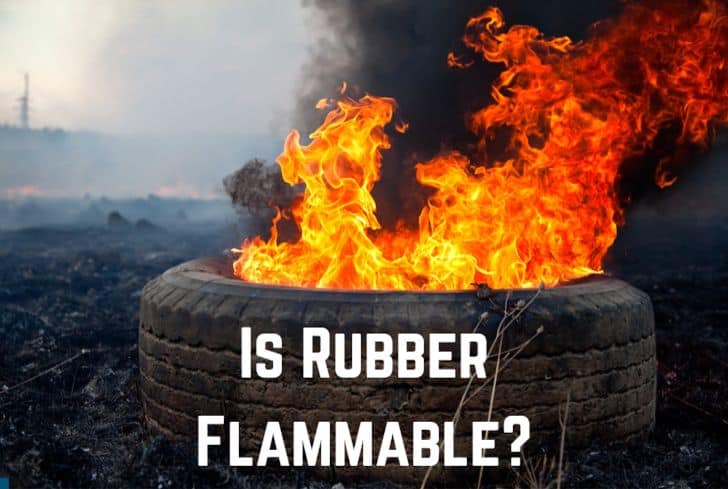Does Sulfur Conduct Electricity? (No…..But Why?)
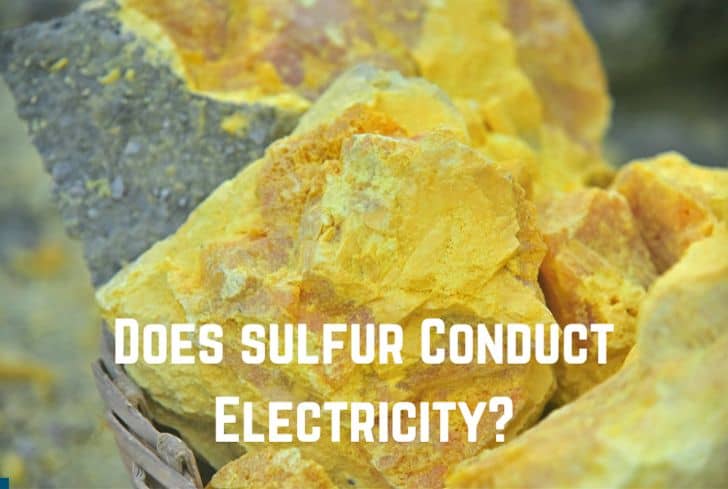
Sulfur is a nonmetallic chemical element having the symbol S and atomic number 16. It belongs to the oxygen group (Group 16 [VIa]) of the periodic table and is one of the most reactive elements. Sulfur is the fifth most abundant element on Earth, and a vast amount of sulfur is produced every year to make sulfuric acid, which has various industrial uses.
Have you ever wondered if sulfur can conduct electricity? In this article, we are going to discuss just that. We will begin by looking at the properties of sulphur. Then we will talk about the chemical’s reaction with water. Finally, we will discuss whether or not sulfur conducts heat.
Read: Does Magnesium Conduct Electricity?
Can Sulfur Conduct Electricity?
No, sulfur does not conduct electricity. This is because it is a non-metal, all of which are usually poor conductors of heat and electricity. Sulfur does not have any free electrons that can move around. Therefore it cannot carry the electric charge from place to place.
Sulfur belongs to Period 3 on the periodic table, which consists of a total of 8 elements: sodium, magnesium, aluminium, silicon, phosphorus, sulfur, chlorine, and argon. Amongst these, electrical conductivity increases from sodium to aluminium but decreases from silicon onwards.
A substance conducts electricity if it has charged particles that can move from one place to the next. Metals conduct electricity in both solid and liquid states, and ionic compounds conduct electricity when dissolved in water. Covalent compounds do not conduct electricity with the exception of graphite.
In the molecules of phosphorous, sulfur, and chlorine, the atoms are held together by covalent bonds. These do not conduct electricity because they do not have any free electrons that can move around and carry the electric charge.
Properties of Sulphur
These are the properties of sulfur:
- Appearance and Scent: Pure sulfur is a brittle crystalline solid at room temperature, which is bright yellow in colour. It is tasteless and odourless, although impure sulfur has an odour similar to that of matches. Many sulfur compounds are odoriferous (give off an unpleasant smell); the smells of grapefruit, odorized natural gas, garlic, and skunk scent are due to organosulfur compounds.
- Melting Point and Boiling Point: Sulfur melts at 239.38 °F (115.21 °C), and it boils at 832.3 °F (444.6 °C ). Between temperatures of 68 °F (20 °C) and 122 °F (50 °C), it sublimes, that is, transitions directly from a solid to a gaseous state without going through the liquid state. At 203.4 °F (95.2 °C), below its melting point, cyclo-octasulfur changes from α-octasulfur to the β-polymorph, and later to γ-sulfur, which increases its viscosity.
- Allotropy: Allotropy is the property of some chemical elements to exist in two or more different forms, in the same physical state. Sulfur has over 30 solid allotropes, which is more than any other element. Allotropes are basically different structural modifications of an element, where the atoms are bonded together in different manners. Octasulfur, cyclo-S8 is the most common allotrope.
- Chemical Behaviour: Sulfur is multivalent and combines with almost all elements with valance 2, 4, or 6. Under normal conditions, sulfur hydrolyzes (molecule of water breaks bonds) to mainly form hydrogen sulfide and sulfuric acid. Sulfur can react even with extremely unreactive metals like iridium, although some of these reactions require increased temperature.
- Natural Occurrence: Sulfur is the 10th most common element in the universe. 32S is formed inside massive stars by the fusion of one nucleus of silicon plus one nucleus of helium at a depth where the temperature exceeds 2.5×109 K. In many meteorites, sulfur is usually present in the form of sulfide. The colours of Jupiter’s moon Io are due to the various forms of molten, solid, and gaseous sulfur. On Earth, sulfur can be found near hot springs and volcanic regions.
Today, sulfur is mostly produced as a byproduct when we remove sulfur-containing contaminants from natural gas and petroleum.
Uses of Sulfur
These are the uses of sulfur:
- The most important use of sulfur is in the production of sulfuric acid. Six-sevenths of all produced sulfur goes into this, and sulfur is so widely used in industrial processes that its usage is often seen as an indicator of a nation’s industrial activity and economy.
- Sulfur, as sulfuric acid, is widely used to create sulfate and phosphate fertilizers and also in other chemical processes.
- Sulfur is also used in insecticides, fungicides, and matches.
Besides these uses, sulfur is an essential element for all life, in the form of organosulfur compounds or metal sulfides. Amino acids and vitamins like biotin and thiamine are organosulfur compounds necessary to sustain life. Sulfur is one of the fundamental chemical elements needed for biochemical functioning and is an essential macronutrient for all living beings.
Why is Sulfur a Poor Conductor of Electricity?
Sulfur is a poor conductor of electricity because it is a non-metal, whose atoms are held together by covalent bonds. This means that it does not have any electrons that can move around and pass the electrical charge from one place to another.
Metals are able to conduct electricity because, in their atoms, the outer electrons are not associated with any particular atom or covalent bond. Therefore, they can move freely and pass the electrical charge.
Like charges repel each other, therefore the movement of one free electron causes movement in the next atom, and the process continues. The electrons keep moving in the direction of the current, that is, towards the positively charged end. Check out this video by Dr. Marsh to learn more about metallic conductivity.
Read: Does Brass Conduct Electricity? (Is It Insulator or a Conductor?)
Sulfur does not conduct electricity because it is a non-metal. Its atoms are held together by covalent bonds, and therefore, it does not have any free electrons that can move around and pass the electrical charge.
Is Sulfur a Conductor or Insulator?
Sulfur is an insulator because it does not allow electricity to pass through it. Electricity is transferred by electrons flowing through materials. Sulfur is a non-metal, which does not have free electrons, and therefore it cannot conduct electricity.
A conductor is a material that allows electrons to travel through it, for example, copper wires. Materials that inhibit the flow of electrons are known as insulators, such as rubber.
Sulfur is a non-metal, whose atoms are held together by covalent bonds. As such, it does not have any free electrons that can move around and pass the electrical charge from one point to another. This is why it is an insulator.
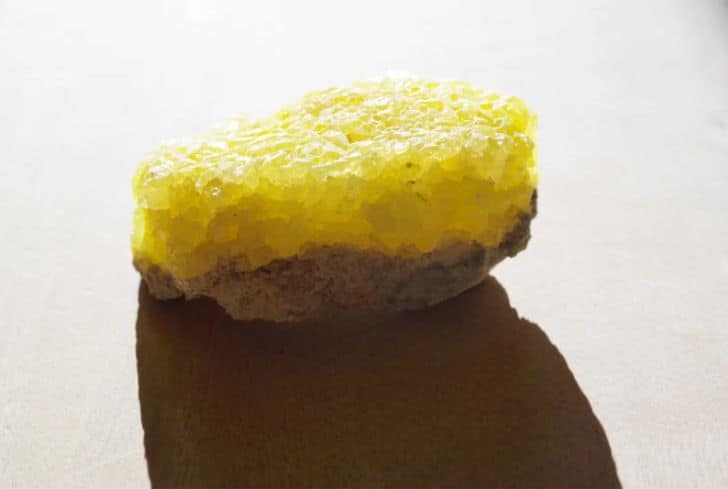
Is Sulfur Soluble in Water?
No, sulfur is not soluble in water. This is because sulfur is non-polar in nature while water is a polar solvent. Sulfur is a stable solid, which does not form new bonds with water, so it is insoluble. However, sulfur is soluble in carbon disulfide and in other nonpolar organic solvents.
Sulfur normally exists as S8, a stable solid. In order for a molecule to get dissolved in water, it must break some of its bonds and make new bonds with H2O.
The attraction of water molecules is not enough to break sulfur’s bonds. This is why sulfur is not soluble in water, However, sulfur is soluble in carbon disulfide and, to some extent, in other nonpolar organic solvents, like benzene and toluene.
Does Sulfur React With Water?
No, sulfur does not react with water. This is because sulfur is non-polar while water is a polar solvent. Water exists as molecules that are held together by hydrogen bondings, which are the strongest intermolecular bonds. Sulfur and water do not react because their mixture is energetically unfeasible.
Solubility depends on the strengths of different intermolecular bonds. Sulfur usually exists as S8, and because of the synonymous sulfur atoms in its structure, it can only do a Van der Waals interaction between them.
In H2O, oxygen is electronegative while hydrogen is the most electropositive element. This means that their intermolecular force of attraction is quite high. For compounds to mix together, the solution must be energetically favourable.
The hypothetical solution between water and sulfur at best would lead to Pd-Pd interactions, which are less stable and less strong than H bonds. This is why sulfur and water do not react with each other.
Does Sulfur Conduct Heat?
No, sulfur does not conduct heat, just as it does not conduct electricity. Sulfur is a non-metal, all of which are usually poor conductors of heat and electricity. Sulfur atoms are held together by covalent bonds. So, unlike metals, it does not have free electrons that can move easily and transfer heat from one place to another.
Thermal conductivity is quite similar to electrical conductivity. Metals are able to pass heat because of their free electrons, whose vibration causes the adjacent atoms to vibrate too. This motion/kinetic energy allows heat to move through the metal, quite similar to how we rub our hands together to feel warm.
Sulfur is a non-metal, which does not have any free electrons. Therefore, it cannot conduct either heat or electricity.
Read: Does Graphite Conduct Electricity? (Yes. But Why?)
Conclusion
In this article, we have discussed whether sulfur can conduct electricity or not. We began by looking at the properties of sulfur and its various uses. Then we discussed why sulfur, having covalent bonds, does not have free electrons and therefore cannot conduct electricity. Similarly, we talked about sulfur’s interaction with water and heat.

![Is Chapstick Flammable? [Lip Balm, Lipstick, Lip Gloss]](https://eartheclipse.com/wp-content/uploads/2023/03/is-chapstick-flammable.jpg)

